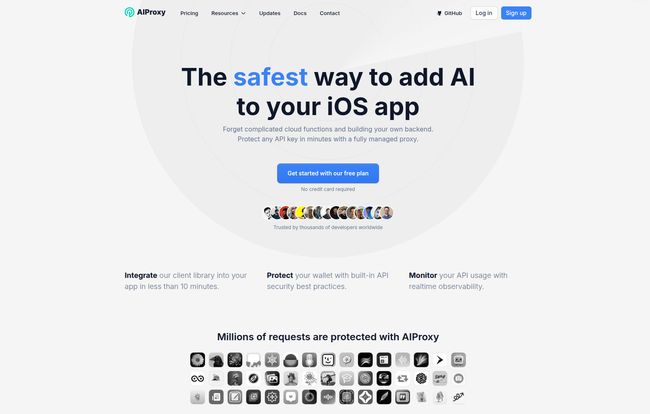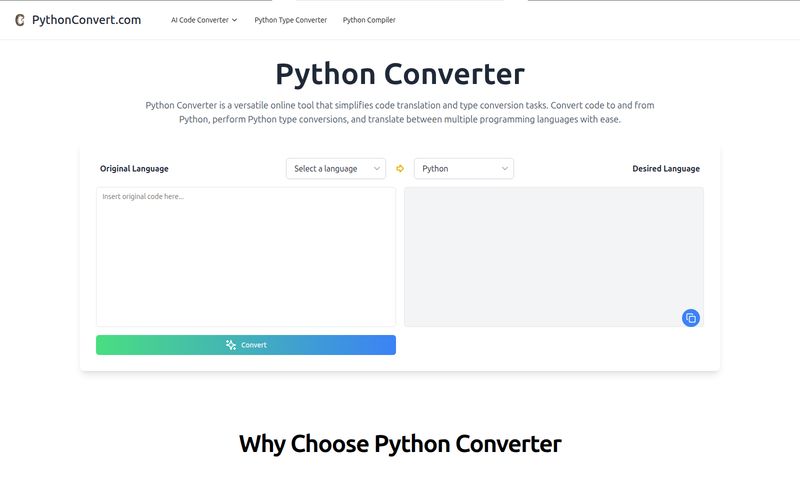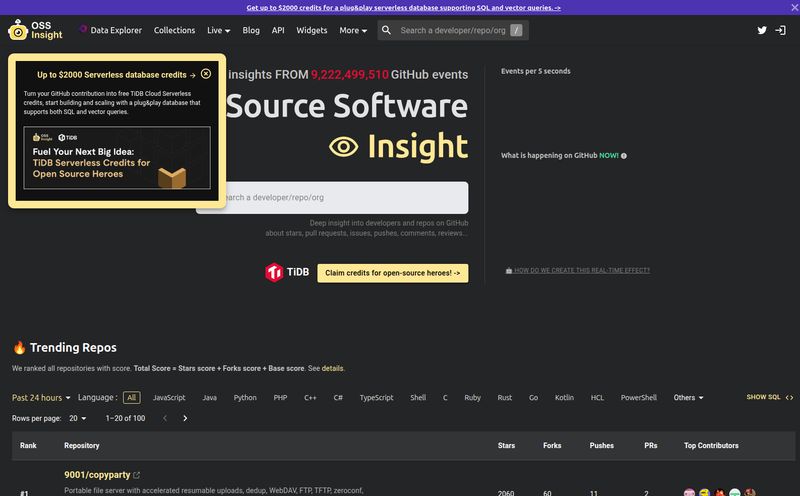We've all been there. You're deep in the zone, building that slick new AI feature for your iOS app. You've got the OpenAI API humming, the prompts are perfect, and everything just works. Then, that little voice in the back of your head pipes up.
Uh, where are you putting that secret API key?
Suddenly, you're faced with a miserable choice. Do you commit the cardinal sin of shipping the key directly in your app, basically leaving your house keys under the doormat for the entire internet to find? Or do you sigh, put your cool feature on hold, and start the long, boring slog of spinning up a whole new backend server just to make a simple API call securely? It’s a classic developer headache.
For years, I've seen indie devs and small teams wrestle with this. Honestly, building a proxy server is a distraction nobody wants. That's why when I stumbled upon AIProxy, I was intrigued. A service that claims to handle all that security mess for you? Sounds too good to be true. So, I dug in. Here’s what I found.
What is AIProxy, Anyway?
Think of AIProxy as a dedicated, hyper-competent security guard for your app’s API calls. Instead of your app talking directly to OpenAI, Anthropic, or Stability AI, it talks to AIProxy. Then, AIProxy, from its secure location, forwards the request with your actual secret key. It’s a middleman in the best possible way.
But calling it just a proxy is selling it short. It’s also your app's accountant and bouncer. It monitors every single request, lets you set spending and usage limits, and can kick misbehaving users or bots to the curb. It’s a fully managed security and observability layer specifically designed for people like us—app developers who want to use powerful AI APIs without building a whole new company to support them.

Visit AIProxy
The Big Security Question: How AIProxy Protects You
This is the most important part. If it can't protect your keys, nothing else matters. The biggest nightmare is waking up to a surprise $80,000 bill from OpenAI because someone ripped the key from your app and used it to write a million terrible novels. AIProxy tackles this with a few clever layers of security.
No More Keys Under the Doormat
First and foremost, your secret API key is never, ever in the client-side code. That alone is a massive win. The service uses a neat split-key system where your app only holds a public, "safe" key. This key can only be used to talk to AIProxy, not the underlying AI service. The actual, valuable secret key lives securely on AIProxy's servers. It's a simple concept, but it's the foundation of not going bankrupt.
The Triple-Lock Security System
Beyond just hiding the key, AIProxy adds a few more locks on the door. It integrates Apple's DeviceCheck, which is a fantastic feature. It helps verify that requests are coming from a legitimate instance of your app running on a real Apple device. This is your first line of defense against bots, emulators, and other shenanigans trying to abuse your service. It can even block jailbroken devices, which are often a source of security issues.
It also uses Certificate Pinning. In plain English, this prevents what’s known as a “man-in-the-middle” attack. It ensures your app is talking only to the real AIProxy server, and not some imposter trying to intercept the traffic. It's a subtle but powerful feature that shows they've really thought about the threat model here.
More Than Just Security: The Control Freak’s Dream
Okay, so it's secure. But the features that got me really excited are the ones that give you fine-grained control. Because security isn't just about blocking attackers; it's also about protecting you from yourself and your users.
The Money-Saving Model Swap
This is, hands down, one of my favorite features. AIProxy lets you set Model Overrides from its dashboard. Imagine you launch your app with the powerful but expensive `gpt-4-turbo`. One day, you notice your costs are skyrocketing. Instead of pushing out a new app update (which can take days to get approved), you can just log into AIProxy, and with a single click, force all requests to use the much cheaper `gpt-3.5-turbo` model. Instantly. It's an emergency brake for your costs, and it is brilliant.
Putting a Leash on Your API Calls
Unchecked usage is almost as dangerous as a leaked key. AIProxy gives you really flexible rate limiting. You can set limits per user, per IP address, or globally. Want to give free users 10 requests per day? Easy. Want to make sure a single person can't spam your API a thousand times a second? Done. This is the kind of stuff that usually requires a ton of custom backend logic, and here it’s just a few text boxes in a dashboard.
See Everything with the Live Console
If you're a data nerd like me, you'll love the observability. The Live Console shows you a real-time stream of requests, errors, and usage patterns. You can finally get answers to questions like: "Which features are people actually using?" or "Are my prompts failing for some users?" This is invaluable for debugging and just understanding your app's health without setting up a complex logging stack.
Getting Started: Is It Actually Easy?
A tool can have all the features in the world, but if it takes a week to set up, it’s a no-go for me. The AIProxy team clearly understands this. The integration is centered around a native Swift client library. You add it via Swift Package Manager, initialize it with your public key, and then... you just use it. The syntax is designed to be a drop-in replacement for how you'd normally make the API calls. I was pretty impressed by how little friction there was. You genuinely don’t need to be a backend expert to get this running in minutes.
Let's Talk Turkey: The AIProxy Pricing Breakdown
Alright, the all-important question: what's it gonna cost? AIProxy uses a pretty standard tiered model based on request volume. They do have a free starting point which is great for just trying it out.
| Plan | Price | Requests / Month | Best For |
|---|---|---|---|
| Starter | $10 / month | 10,000 | Hobby projects & early-stage apps |
| Pro | $50 / month | 100,000 | Growing apps with real users |
| Premium | $200 / month | 1,000,000 | Established products |
| Business | $2,000 / month | 10,000,000 | Large-scale applications |
My take? The value is absolutely there. A $10/month 'Starter' plan is a tiny price to pay for the peace of mind and the development time saved. Building, hosting, and maintaining your own secure proxy server would cost you way more than that in both time and money. The pricing scales fairly, and it feels aimed directly at the people who need it most.
The Good, The Bad, and The Nitty-Gritty
No tool is perfect, right? I'm genuinely impressed with AIProxy, but let's be balanced. The upside is obvious: it's incredibly easy to use, the security features are robust and well-thought-out, and the control you get over costs and usage is fantastic. The customer support also gets high marks, based on the testimonials I've seen. Things like model overrides and live analytics are killer features that would be a pain to build yourself.
On the flip side, you are introducing a dependency on a third-party service. If AIProxy goes down, your app's AI features go down with it (though their business tier offers a 99.99% uptime guarantee). You also have to use their Swift client library, which is simple, but it's still a dependency you have to manage. And while the pricing is fair, if your app becomes a massive hit with tens of millions of requests, teh cost will naturally become a significant line item on your budget. But hey, that's a good problem to have.
Conclusion: So, Should You Use AIProxy?
After digging through it, my answer is a resounding yes, with a small caveat. If you're an indie developer or part of a small team building an iOS or Mac app with AI features, AIProxy feels like a no-brainer. It solves a real, painful, and potentially expensive problem in an elegant and affordable way. It lets you move faster and sleep better at night.
Who isn't it for? If you're a massive enterprise with a dedicated team of backend and security engineers, you've probably already built a similar (and vastly more expensive) solution in-house. But for the 99% of other developers, AIProxy provides a massive leg up, letting you compete on features, not on infrastructure.
Frequently Asked Questions
How does AIProxy store my secret API keys?
AIProxy securely stores your secret keys using industry-standard encryption at rest. The service is built on AWS, so it benefits from their robust physical and network security. Your keys are not exposed to the client app.
Can I use my own OpenAI key with AIProxy?
Yes, absolutely. The entire model is "Bring Your Own Key" (BYOK). You plug your existing API key from OpenAI, Anthropic, or another provider into the AIProxy dashboard, and they manage it from there.
What happens if I go over my monthly request limit?
Typically, services like this will either block further requests until the next billing cycle or automatically upgrade you to the next tier. It's best to check their specific overage policy on their pricing page, but the rate-limiting features are designed to help you prevent this from happening unexpectedly.
Is it hard to integrate AIProxy into a SwiftUI app?
Not at all. Since it uses a standard Swift Package, integration is very straightforward. If you're comfortable making API calls in SwiftUI, you'll find the AIProxySwift library very familiar and easy to adopt.
Does AIProxy work for Android apps?
Currently, AIProxy's marketing and client library are heavily focused on iOS and Mac developers using Swift. While the proxy concept could work for any platform, their current implementation is optimized for the Apple ecosystem. You'd need to contact them to see if an Android solution is on their roadmap.
Is there a free trial or a free plan?
Yes, AIProxy has a free plan to get you started, which is perfect for development and testing before you launch your app. You can find the details on their pricing page.



